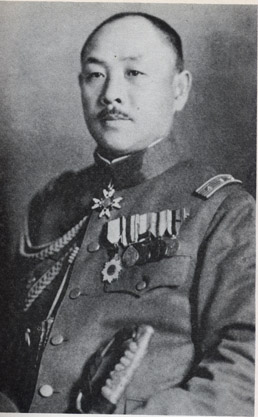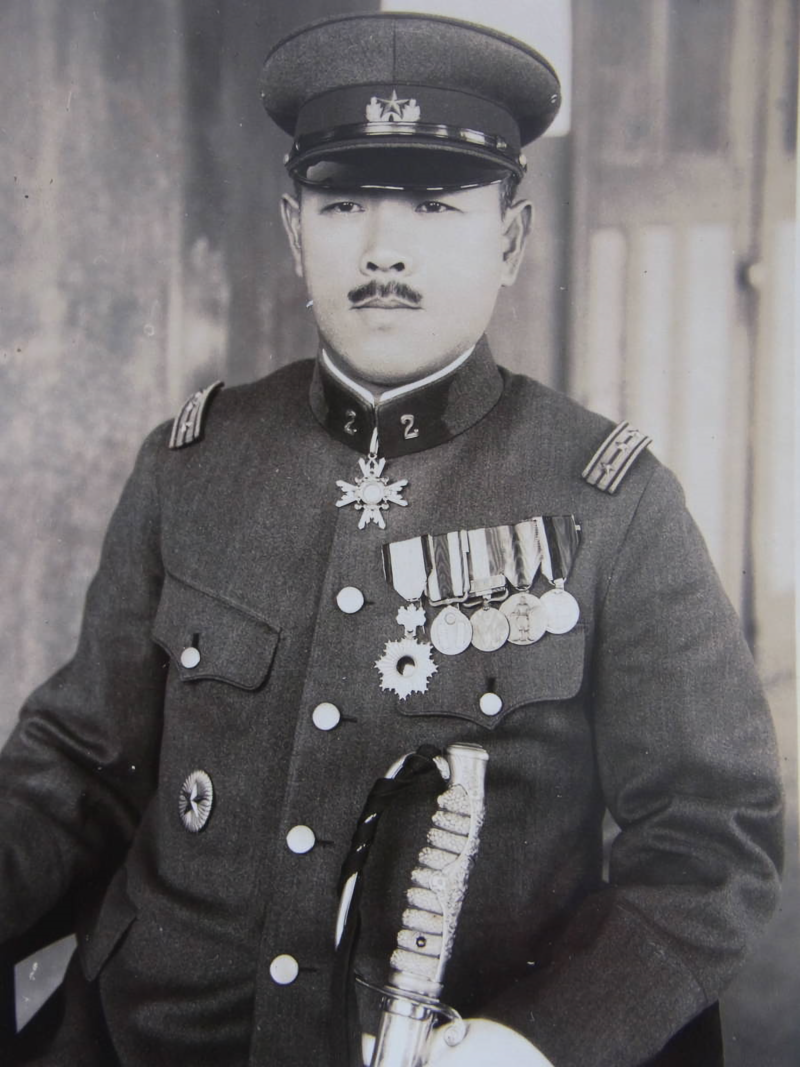<Back to Index>
- Minister of War General Korechika Anami, 1887
PAGE SPONSOR


Korechika Anami (阿南 惟幾 Anami Korechika, 21 February 1887 - 15 August 1945) was a general in the Imperial Japanese Army during World War II, and was War Minister at the surrender of Japan.
Anami was born in Taketa city in Ōita Prefecture. He attended the Imperial Japanese Army Academy, and was commissioned as a second lieutenant in the Infantry in December 1906.
In November 1918, Anami graduated from the Army War College with the rank of captain. He was assigned to the Imperial Japanese Army General Staff from April 1919 and was promoted to major in February 1922. From August 1923 to May 1925 he was assigned to the Sakhalin Expeditionary Army. Anami was promoted to lieutenant colonel in August 1925.
From August - December 1925, Anami was sent as a military attaché to France. On his return to Japan, he was assigned to the 45th Infantry Regiment, and became unit commander in August 1928.
From August 1929 - August 1930, Anami served as Aide - de - camp to Emperor Hirohito. He was then promoted to colonel.
From August 1933 - August 1934, Anami served as
regimental commander of the 2nd Guard Regiment of the Imperial Guards. He was
subsequently Commandant of the Tokyo Military Preparatory
School, and promoted to major general in March 1935.
From August 1936, Anami served as Chief of the Military Administration Bureau of the War Ministry. He became Chief of the Personnel Bureau in March 1937 and was promoted to lieutenant general in March the following year.
With the start of the Second Sino - Japanese War, Anami was given a combat command, as Commander of the IJA 109th Division in China from November 1938. He was recalled to Japan in October 1939 to assume the role of Vice Minister of War. However, in April 1941, Anami returned to China as Commander in Chief of the IJA 11th Army, covering operations in central China. He was transferred to the Japanese Second Area Army in Manchukuo in July 1942.
In May 1943, Anami was promoted to full general. As the war conditions in the Pacific deteriorated for the Japanese, Anami was reassigned to the Southern Theater from November 1943, where he directed operations in western New Guinea and Halmahera.
Anami was recalled to Japan December 1944, becoming Inspector General of Army Aviation
and Chief of the Army
Aeronautical Department, while concurrently
serving on the Supreme War Council (Japan). In April 1945,
he was appointed War Minister.
| “ | I am convinced that the Americans had only one bomb, after all. | ” |
|
—Korechika Anami, immediately after the drop of Little Boy over Hiroshima |
||
As War Minister, an ultra - nationalistic Anami was outspoken against the idea of surrender, despite Japan's losses on the battlefield and the destruction of Japan's cities and industrial capability by American bombing. Even after the bombings of Hiroshima and Nagasaki, Anami opposed talk of surrender, and proposed instead that a large-scale battle be fought on the Japanese mainland causing such massive Allied casualties that Japan would somehow be able to evade surrender and perhaps even keep some of what it had conquered.
Eventually, his arguments were overcome when Emperor Hirohito directly requested an end to the war himself; Anami's supporters suggested that he either vote against surrender or resign from the Cabinet. Instead, he ordered his officers to concede, later saying to his brother - in - law, "As a Japanese soldier, I must obey my Emperor." He informed the officers of the War Ministry of the decision, and that as it was an Imperial command, they must obey.
On 14 August 1945, Anami signed the surrender document with the rest of the cabinet, then attempted to commit suicide by seppuku early the next morning. Failing to conduct the ritual properly he had to be dispatched by his brother - in - law. His suicide note read: "I — with my death — humbly apologize to the Emperor for the great crime." This "cryptic" note is open to multiple interpretations. It is possibly a reference to his part in the aborted coup against Emperor Hirohito in the hours following Japan's decision to surrender at the end of World War II, the decision to surrender itself, or the Imperial Army's involvement with the war itself.
Anami's grave is at Tama Cemetery, in Fuchū, Tokyo. His sword and blood-splattered dress uniform and suicide note are on display at the Yūshūkan Museum next to Yasukuni Shrine in Tokyo.
Anami's son Anami Koreshige served as Japan's ambassador to China from 2001 - 2006.